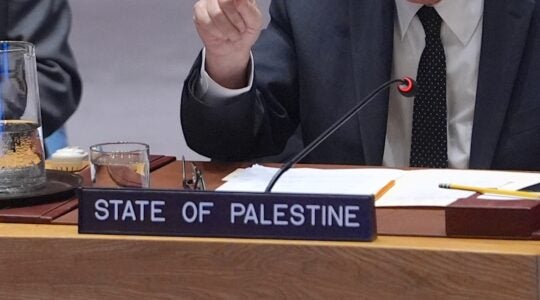With the Obama administration determined to see the Iran nuclear agreement passed in Congress, and increasingly belligerent toward its critics, many opponents of the deal worry that by continuing to wage what appears to be a losing fight in Washington, Israel will pay a heavy price The Day After the mid-September vote.
But several key anti-deal Israeli and American Jewish officials I have spoken to in recent days insist that is not the case. Rather, they say that in addition to the moral imperative of opposing what they view as a catastrophic deal threatening Israel’s security short-term, and America’s down the road, they are driven by the conviction that their sharp criticisms of the historic initiative will pay off in very real terms, win or lose.
As the Jewish communal divide deepens over the agreement, with 340 rabbis from around the country this week signing on to a letter to Congress in support, and the Anti-Defamation League and American Jewish Committee joining AIPAC in opposition, the lobbying efforts in Washington intensify. Critics of the agreement acknowledged surprise at how deeply and personally engaged President Obama is in the fight, offering to speak with any member of Congress questioning the deal. “We’re still in the game, but it’s an uphill fight,” said one national Jewish lay leader opposed to the agreement.
Even if, as expected, the president prevails in the congressional vote — it would take a two-thirds vote in both Houses to defeat him — Israel will be better off for having made its case, these insiders believe. They say that despite the open rancor between Obama and Israeli Prime Minister Netanyahu, the U.S.-Israel relationship is deep and resilient enough to withstand the strains.
“I expect that if the Iran deal is approved, the administration will want to sit down with Israeli leaders soon after and say ‘OK, now how can we make Israel as strong as possible going forward?” noted one key Israeli official, who, like the others interviewed here, spoke candidly but off the record.
He and the others I spoke with stressed that they do not doubt the president’s sincerity, only his judgment, in saying this agreement will protect Israel.
One official insisted that all the talk about “unbreakable bonds” between Washington and Jerusalem is more than rhetoric, and reflects deep resilience. “We are mishpocha [family], which means we have fights sometimes but we are still family,” the official said. And going to the mat in speaking out against the deal underscores to Washington just how serious Israel’s concerns are, he added.
The fact that leading Arab Gulf states, and most notably Saudi Arabia, have appeared to pivot on the Iran deal in recent days — from vociferous opposition to tacit approval — is an indication of their insecure relationship with Washington, the insiders say. “They are still furious with the administration,” one Jewish leader said, “but they realize their societies don’t promote human rights, democracy and economic freedom with the U.S. They felt they had to give in, at least publicly, to maintain the relationship with Washington.”
Israel, he said, is a different story — one of shared democratic values and strategic interests with the U.S.
But what happens if Congress overrides a presidential veto?
That’s the No. 1 question being asked by most of the undecided members of Congress, according to several people who have met with key Democrats in the House and Senate. They worry that an override could result in the worst of both worlds: a humiliated and bitter Obama; an Iran with no obstacles in its race to build the bomb; and the lifting of international sanctions, allowing Iran to fund terror groups like Hamas and Hezbollah with billions of dollars.
The advocates who oppose the deal insist that a congressional override is worth the risk of offending the president because it may well lead to a tougher agreement and a more secure Israel and Mideast. They note that while Obama insists the choice is between a “yes” vote for an agreement that blocks Iran’s path to nuclear arms and a “no” that would lead to another Mideast war, there is a very real alternative — a way to say, in effect, “not yet,” and beef up the agreement.
Robert Satloff, executive director of the Washington Institute for Near East Policy, a Mideast think tank, makes that case in a piece on The Atlantic website titled “There Is a Path to a Deal With Iran.” It offers several suggestions that he says could strengthen the agreement “without reopening the negotiations” between Iran and the world powers. The proposals include: making public the penalties for Iran violations of the agreement and/or for transferring “windfall funds from sanction relief” to Iranian allies like Hezbollah and Syrian President Assad; bolstering efforts by the U.S. and its allies to block military actions by Iran-supported militia in the region; affirming publicly that the U.S. will use military force to block any attempt by Iran to produce a nuclear bomb; and enhancing Israel’s deterrence capabilities by having the U.S. provide Jerusalem with the Massive Ordnance Penetrator, the so-called bunker-busting bomb able to do serious damage to Iran’s underground nuclear sites, along with the airplanes to carry the MOP.
Satloff says that those and similar efforts to bolster the Iran agreement could be achieved before or after a vote by Congress. He points out that according to the agreement, the economic sanctions imposed by the U.S. are only to be lifted after Iran complies with its promise to rid itself of most of its enriched uranium, stop work on its Arak plutonium reactor and pack away thousands of centrifuges. That could take six to nine months.
“The chances are high that they [the Iranians] would follow through on their commitments … because the deal is simply that good for Iran,” according to Satloff, since Iranian compliance would end United Nations and European sanctions and provide Tehran desperately needed economic relief.
If Congress votes “no” in September, a chastened Obama would have time to toughen up the deal so that Congress could then approve “his new and improved proposal.”
It’s a logical argument, and a practical one in that it does not require going back to the negotiating table with Iran. What’s more, it would give truth to the president’s longstanding insistence that “no deal is better than a bad deal” by bolstering the current agreement and re-establishing the image of an America acting out of conviction and strength rather than anxiety and weakness.
The New York Jewish Week brings you the stories behind the headlines, keeping you connected to Jewish life in New York. Help sustain the reporting you trust by donating today.





